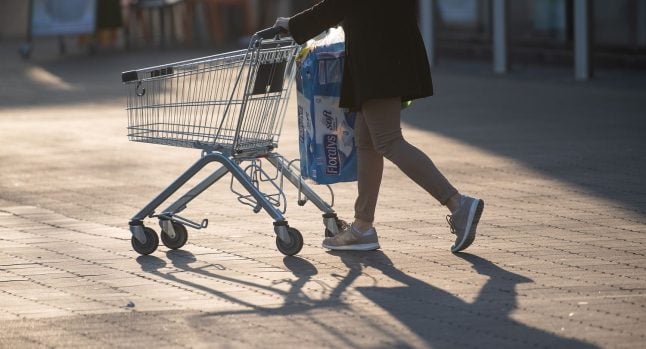Now new data from Germany’s Federal Statistical Office shows what Germans have already stocked up on, as well as which goods remain in high demand.
The data examines sales figures for products from March 30th to April 4th.
Contrary to what many might expect, the statistics reveal that many people are no longer stocking up on toilet paper, often dubbed “white gold” by Germans during the corona crisis.
READ ALSO: 'People love it': Toilet paper cakes fly off shelves at Dortmund bakery
Sales were 29 percent below the average of the previous six months during the first week of April. Just the week before (March 23rd to 29th) they were still up by almost half (46 percent), showing the quick decrease in sales numbers.
#Coronakrise: Ist dies schon Licht am Ende des Tunnels ? Es gibt wieder #Toilettenpapier und #Desinfektionsmittel in #Deutschland zu #Ostern! #CoronaVirusDE #Corona #Virus #Edeka pic.twitter.com/t6jW2NePLi
— Gedanken (@sinnsturm) April 11, 2020
Toilet paper could (often) be spotted on supermarket shelves again leading up to Easter.
Avoid the 'hamster' urge
Politicians and business associations continue to reassure the public that there is no supply bottleneck and that they should refrain from “Hamsterkäufen,” or panic buying.
READ ALSO: German word of the day: Der Hamsterkauf
The top products people continue to hoard are soaps and disinfectants, leaving many store shelves bare.
After a brief slump in the week from March 16th to 22nd, sales of disinfectant gels and sprays rose again to more than three times (276 percent) the average at the beginning of April.
Other unexpected food increases include a 400 percent rise in the sale of pre-prepared bread mixes towards the end of March. Staples like pasta and soups also spiked earlier in March and remain high.
READ ALSO: Coronavirus: Why people in Germany don't need to panic buy
Germans also seem to be coping healthfully: beer and soft drink sales have been down for weeks – around three and five percent respectively.
It seems Germans aren't giving in to their vices during this trying time. Unless, of course, you count canned sausages as a bad habit, as sales for those are up by 155 percent for the entire year. 
This graph shows the sales of certain food and hygiene products over calendar weeks at the end of 2019 and 2020 (in KW, or calendar weeks). Source: Destatis
Sales fluctuate amidst uncertain circumstances
Overall, the sales figures for food and hygiene products in the last week of March largely declined compared to the massively above-average figures the first two weeks of the month.
The sales figures for sugar in the 14th calendar week were only 10 percent above the six-month average; rice was only 12 percent above.
While yeast sales were still below average in the 13th calendar week by 37 percent, they were up 28 percent during the 14th calendar week.
There could be various reasons for these fluctuating and declining sales figures. On one hand, an in-demand product may have saturated the market. However, lower numbers could also indicate a supply shortage.
Many stores are reporting an increase in house-brand sales, meaning that many shoppers are ditching name-brands to get the products available.



 Please whitelist us to continue reading.
Please whitelist us to continue reading.
Member comments